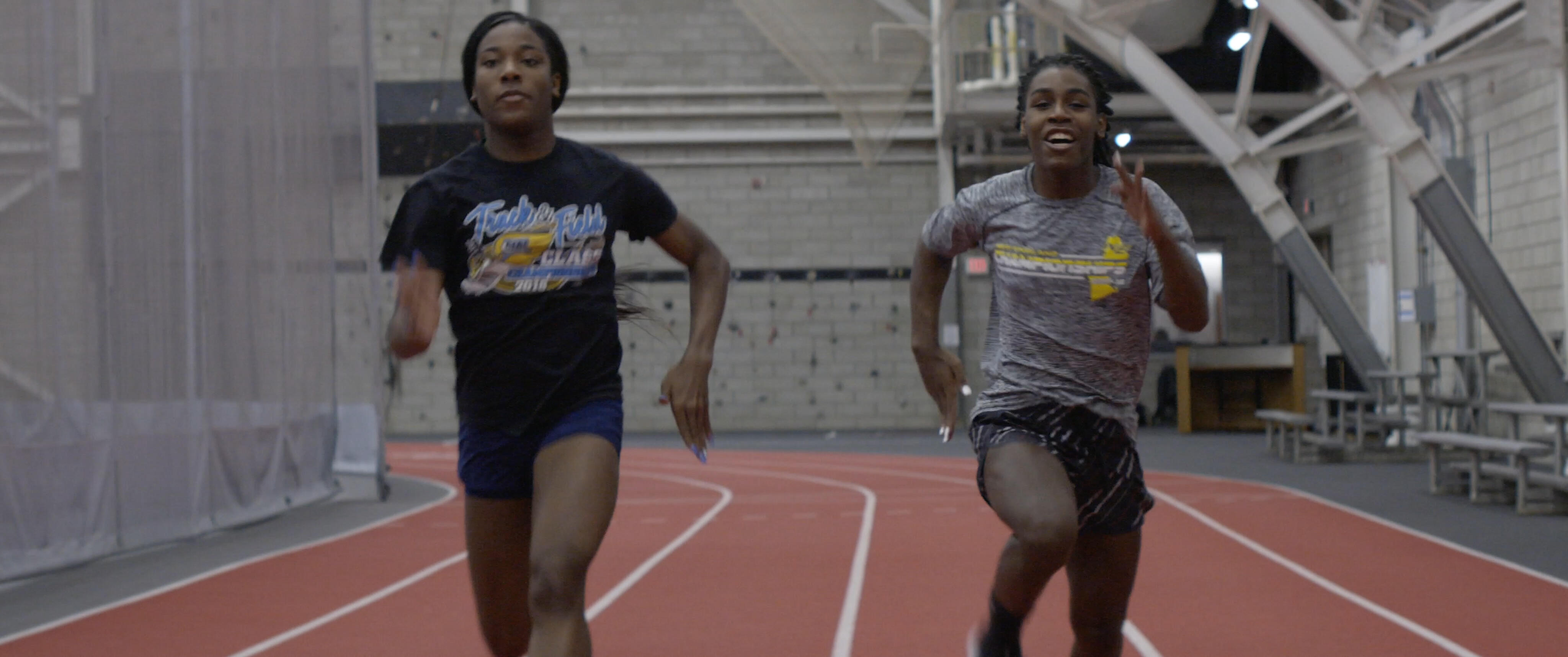Trans rights often get traduced into two oversimplified talking points: bathrooms and sports. Michael Barnett’s documentary Changing the Game, now streaming on Hulu, addresses the latter, putting a very human face on the issue of trans athletes. Their fight to win doesn’t end with a stopwatch or a finish line; it continues before and after each match, against parents, discriminatory policies, and their own journeys as they morph into adults.
Barnett follows four trans athletes: Mack Beggs, a male wrestler in Texas forced to compete on the girl’s team; Sarah Rose Huckman, a nordic skier in New Hampshire with a proclivity for politics; and Andraya Yearwood and Terry Miller in Connecticut, track teammates on a winning streak despite WASP-y mom protestations.
Barnett lets his subjects speak for themselves as they go about the daily drudgery of being student athletes, with the coupled pressure of doing so as out trans teens. Though the subject is inherently political, the documentary itself is also a solid sports doc boasting athleticism, tense moments of competition, wide-ranging interviews, and narratively driven stories.
READ: You Know You Love It—the Gayer ‘Gossip Girl’ Revival Releases First Look Trailer
Mack, the sole white transgender male of the quartet, gets the most screen time as he competes over the course of his senior year in high school. Already the Texas state girls team champion, he’s training to win the title again.
“I am a man,” he says at one point, later adding, “It’s not fair for anybody.” He wants to compete on the boys team, but Texas law requires students to compete according to the gender assigned at birth. Watching his coach and adoptive grandparents cheering him on is moving—but watching the young women he triumphs over upset at losing can be difficult.
READ: Review: 6-Part Docu Series ‘Pride’ May Seem Like Homework But It’s a Fresh Take on Gay History
Perhaps the most surprising aspect of Changing the Game is just how many openly conservative parent figures are supportive of their children. Mack’s grandmother—a gun-toting, Bible-thumping Republican who still sometimes uses the wrong pronoun—is leading the charge to help Mack play on the men’s team at college. In New Hampshire, Sarah’s parents are also right-leaning, but refuse to let politics dictate their unwavering support for transgender rights.
When she’s not competing, the skier is busy trying to pass an anti-discriminatory bill through the state’s legislature and speaking out for trans rights across the state. By the time we see her delivering a speech on the floor of the state senate, Barnett has us half convinced that she is poised to become the Greta Thunberg of trans rights advocacy.
Sarah’s story also provides a facet of teen trans life that is usually missing from the conversation: the banality of it. Sarah’s a vlogger who offers make-up tips and wants to fall in love with Prince Charming, one who rolls her eyes at the endless bathroom debate and says, “I just want to be able to pee and poop in peace—and maybe put some makeup on in the mirror.”
While Sarah has support in New Hampshire, Andraya Yearwood and Terry Miller aren’t as lucky in Connecticut.
The parents of their classmates are especially vocal—one mom yells directly in Andraya’s face in one of the more upsetting moments of the film. To them, it’s unfair that these girls get to compete on the girls team and beat their own children. To the state of Connecticut, however, it is discriminatory to treat a student differently in athletics than in class.
There’s a conversation to have about biology and genetics and sports, but these moms aren’t interested in having a dialogue: They’re angry, and they want these teenagers to know it and be scared of it. (One seems particularly angry that Andraya and Terry won’t ever have to run on their periods.)
At least Andraya and Terry have one another and other friends their age. They talk about boys, they paint their nails, and they celebrate each other’s victories. And Andraya’s mom, a self-professed tomboy, is open about her joy at getting in touch with her feminine side after Andraya came out.
What Changing the Game lays to rest—if the anti-trans activists ever bother to watch it—is the suspicion that trans athletes are somehow gaming the system by expressing their true gender identity. And with a 40 percent chance of trans teens attempting or committing suicide, how refreshing to watch a movie celebrating the triumphs of four fearless trans athletes. The race is far from over, but Changing the Game makes clear how much ground we’ve already covered.
Get real time update about this post category directly on your device, subscribe now.




